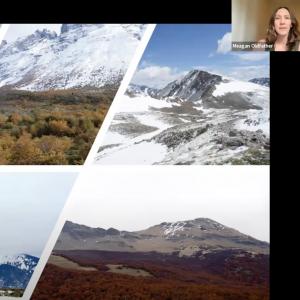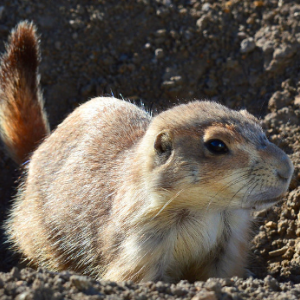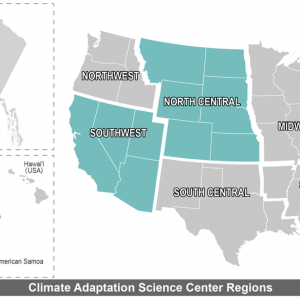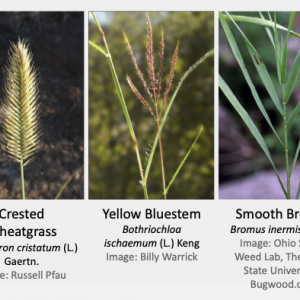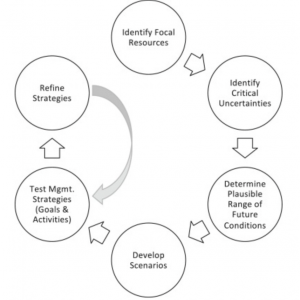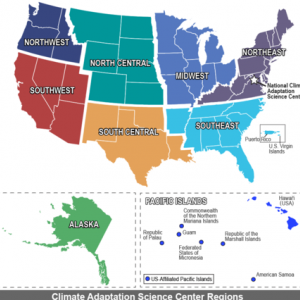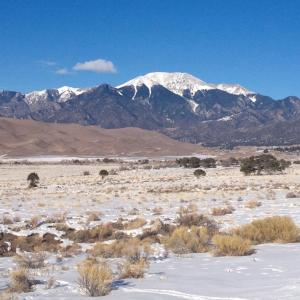News
NC CASC webinar recording available
Biogeography entwines the studies of demography, disturbances, dispersal, and in light of changing climate – disequilibrium dynamics. All of these ecological and evolutionary processes interact to shape the stability of species current and future distributions, and – as I will focus on in this talk – may be influenced by landscape heterogeneity.
Celebrating Indigenous Peoples' Day
The NC CASC recognizes the deep relationship that Indigenous peoples have as caretakers of the lands that comprise the United States of America and beyond. We honor their past, present and future stewardship of these lands, and recognize the importance and value of Indigenous Knowledges in addressing the environmental challenges we face today.
NC CASC’s Dr. Imtiaz Rangwala provides guidance on modeling habitat suitability under future climate for new publication on black-tailed prairie dog
NC CASC’s Dr. Imtiaz Rangwala provided guidance on the development and use of climate scenarios for modeling suitable black-tailed prairie dog habitat in the future.
Funding Opportunity: Applications Open to Host the Southwest and North Central Climate Adaptation Science Centers
Qualified organizations are invited to apply to host and, as applicable, serve as consortium partners for the North Central Climate Adaptation Science Center (NC CASC) and Southwest Climate Adaptation Science Center (SW CASC).
The Prairie Climate Companion: Invasive Species
In grassland ecosystems, herbaceous invasive species decrease native species diversity, reduce forage quality and quantity for animals, alter habitat structure, and affect nutrient cycling and availability. Check out the next issue of The Prairie Climate Companion to learn more.
New Publication on Scenario-Based Decisions
Congratulations to USGS research ecologist, Dr. Brian Miller, on a new publication titled, "Scenario-Based Decision Analysis: Integrated scenario planning and structured decision making for resource management." The publication includes members of the NC CASC: Dr. Imtiaz Rangwala, Dr. William Travis, as well as other partners.
USGS Announces New Leaders for Five Regional Climate Adaptation Science Centers
Yesterday, the US Geological Survey published a national news release announcing five new Regional Administrators (formerly known as “directors”) for the Climate Adaptation Science Centers (CASCs). The new Regional Administrators are: Olivia LeDee at the Midwest CASC, Molly Cross at the North Central CASC, Carrie Brown-Lima at the Northeast CASC, Suzanne Von Cooten at the South Central CASC, and Stephanie McAfee at the Southwest CASC.
Welcome, Dr. Molly Cross!
We are pleased to welcome Molly Cross as the new North Central CASC Regional Administrator (the position formerly known as “Center Director”)! Molly officially started in her new role yesterday, September 25th. Molly joins the CASC network from the Wildlife Conservation Society (WCS), where she served as the Climate Adaptation and Resilience Lead for their Global Forests and Climate Change Program.
Next Webinar: October 12, 2023
Biogeography entwines the studies of demography, disturbances, dispersal, and in light of changing climate – disequilibrium dynamics. Hear more from NC CASC/USGS biologist, Dr. Meagan Oldfather, during her October 12 webinar titled, "Climate Responses and Adaptation in Heterogeneous Landscapes."



